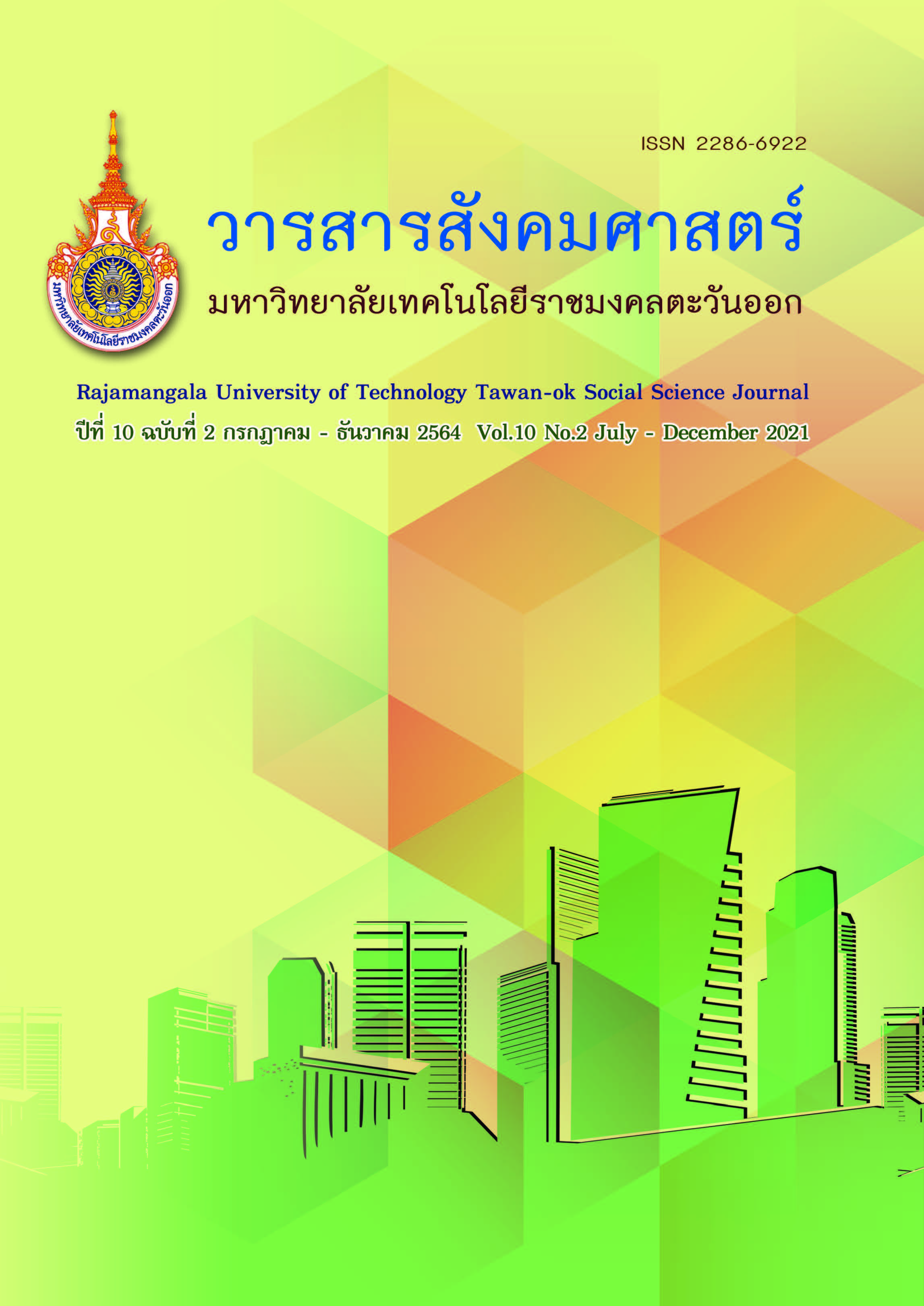Leadership and Community Engagement Affecting Participation of Community Based Tourism (CBT) Management: A Case Study of U-Thong Ancient Area, Suphanburi Province
Main Article Content
Abstract
The objective of the study entitle was to study the leadership factor and community
engagement factor that affected community participation in community - based tourism management.
By using integrated research method between quantitative research and qualitative research. The
research was conducted in U Thong Municipality and Thao U Thong Municipality, Suphanburi province.
The instrument used in the research was questionnaire about Transaction leadership, Transformation
leadership, community engagement and community participation in community - based tourism
management. And in-depth interviews to explain and confirm the information obtained from
quantitative research.
The results of the study revealed that 1) Transaction leadership, Transformation leadership,
community engagement and community participation in community - based tourism management a
case study of U Thong ancient area, Suphanburi province at a high level in all aspects. 2) Transaction
leadership, Transformation leadership and community engagement are positively correlated to
community participation in community - based tourism management a case study of U Thong ancient
area, Suphanburi province with statistical significance at the level of 0.01. 3) The factors that affect
community participation in community - based tourism management a case study of U Thong ancient
area, Suphanburi province, comprised the leadership of Contingent Reward, the leadership of
Management-by-Exception : ME the leadership of Intellectual Stimulation the engagement of
willingness to exert effort towards organization goal accomplishment; and the engagement of strong
desire to maintain organizational membership.
Article Details
References
กุลวดี ละม้ายจีน. (2558). “กระบวนการการจัดการการท่องเที่ยวโดยชุมชนในเขตพื้นที่พิเศษเมืองโบราณอู่ทองจังหวัด สุพรรณบุรี.” วารสารมนุษยศาสตร์และสังคมศาสตร์ มหาวิทยาลัยราชภัฏอุบลราชธานี 6, 2 (กรกฎาคม- ธันวาคม): 55-66.
ฉัฐสิณี หาญกิตติชัย. (2559). “ภาวะผู้นำประสิทธิผลของวิสาหกิจชุมชน และตัวแบบการพัฒนาภาวะผู้นำด้านการ ประกอบการ.” การประชุมทางวิชาการเสนอผลงานวิจัยระดับบัณฑิต ภาคตะวันออกเฉียงเหนือ ครั้งที่ 3, 331-341.
ณัฏฐพัชร มณีโรจน์. (2560). “การจัดการการท่องเที่ยวโดยชุมชน.” วารสารวิชาการการท่องเที่ยวไทยนานาชาติ 13, 2 (กรกฎาคม - ธันวาคม): 25-46.
ทิพย์สุดา พุฒจร. (2560). การจัดการท่องเที่ยวโดยชุมชนเพื่อการพัฒนาชุมชนอย่างยั่งยืน. เพชรบุรี: คณะวิทยาการ จัดการ มหาวิทยาลัยศิลปากร.
นิภาภรณ์ จงวุฒิเวศย์. (2553). “ปัจจัยที่ส่งผลต่อความสำเร็จในการดำเนินงานของธุรกิจชุมชนในเขตอำเภอเมือง จังหวัดร้อยเอ็ด.” วารสารมหาวิทยาลัยราชภัฏมหาสารคาม 4, 2 (พฤษภาคม - สิงหาคม): 103-111.
ปิ่นฤทัย คงทอง. (2559). “ปัจจัยที่ส่งผลต่อความสำเร็จของการพัฒนาแหล่งท่องเที่ยวเชิงวัฒนธรรมของจังหวัด นครศรีธรรมราช.” วารสารวิชาการการท่องเที่ยวไทยนานาชาติ 12, 2 (กรกฎาคม - ธันวาคม): 1-32.
พจนา สวนศรี. (2550). คู่มือเครือข่ายการท่องเที่ยวโดยชุมชน. กรุงเทพฯ: ศรีเมืองการพิมพ์.
พิภพ ครองธรรม. (2561). การบริหารจัดการเพื่อส่งเสริมการมีส่วนร่วมของประชาชนในการพัฒนาเมืองโบราณอู่ทอง ขององค์การบริหารการพัฒนาพื้นที่พิเศษเพื่อการท่องเที่ยวอย่างยั่งยืน (องค์การมหาชน). วารสารการบริหาร ปกครอง 7, 2 (กรกฎาคม - ธันวาคม): 474-501.
ลลิตา จันทร์งาม. (2559). “ปัจจัยที่ส่งผลต่อความผูกพันต่อองค์การของพนักงาน ธนาคารออมสิน สำนักงานใหญ่ กลุ่มลูกค้าบุคคล.” การค้นคว้าอิสระรัฐศาสตรมหาบัณฑิต มหาวิทยาลัยธรรมศาสตร์.
วริศรา สมเกียรติกุล. (2561). “การมีส่วนร่วมในการจัดการสิ่งแวดล้อมของชุมชนเพื่อพัฒนาแหล่งท่องเที่ยว กรณีศึกษา ชุมชนตำบลน้ำผุด อำเภอละงู จังหวัดสตูล.” วารสารวิชาการมหาวิทยาลัยราชภัฏอุตรดิตถ์ 13, 1 (มกราคม - มิถุนายน): 47-63.
ศิรินาถ ราชคำ. (2557). “ความสัมพันธ์ระหว่างภาวะผู้นำการแลกเปลี่ยนเรียนรู้ และการทำงานเป็นทีมกับผลการ ดำเนินงานของกลุ่ม OTOP กรณีศึกษากลุ่มสนุก (สกลนคร นครพนม มุกดาหาร).” วารสารวิทยาการจัดการ มหาวิทยาลัยวลัยลักษณ์ 3, 1 (มกราคม - เมษายน): 56-64.
ศิริพร พรมไชย. (2555). “ความสัมพันธ์ระหว่างแรงจูงใจกับความผูกพันต่อองค์กรของพนักงานบริษัท A”. การค้นคว้า อิสระบริหารธุรกิจมหาบัณฑิต วิทยาลัยเซาธ์อีสท์ บางกอก.
สราวรรณ์ เรืองกัลปวงศ์ และอรรนพ เรืองกัลปวงศ์. (2558). “การจัดการการท่องเที่ยวเชิงวัฒนธรรมแบบมีส่วนร่วม ของชุมชนเกาะเกร็ด อำเภอปากเกร็ด จังหวัดนนทบุรี.” มหาวิทยาลัยสวนดุสิต.
สุธีญา พรหมมาก. (2554). “ภาวะผู้นำกับการส่งเสริมการมีส่วนร่วมของประชาชนในการพัฒนาด้านการท่องเที่ยว ขององค์การบริหารส่วนตำบลเขาชัยสน จังหวัดพัทลุง.” วารสารวิทยบริการ 22, 3 (กันยายน - ธันวาคม): 30-43.
องค์การบริหารการพัฒนาพื้นที่พิเศษเพื่อการท่องเที่ยวอย่างยั่งยืน. (2561). การท่องเที่ยวโดยชุมชนอย่างยั่งยืน วิถีไทย เก๋ไก๋อย่างยั่งยืน. จุลสารวิชาการการท่องเที่ยว การท่องเที่ยวแห่งประเทศไทย 4, 3 (กรกฎาคม - กันยายน): 54.
Burns, J. M. (1978). Leadership. New York: Harper and Row.
Kotter, J. P. (1990). A force for change: How leadership differs from management. New York: Free Press.
Lamat, R. (2019). “Factors Influencing Sustainable Community based Tourism (CBT) among the Indigenous People of Lambir, Sarawak.” International Journal of Recent Technology and Engineering (IJRTE) 7, 5 (January): n.pag.
Setokoe, T. J. (2019). Community participation in the development of rural areas: a leaders’ perspective of tourism. African Journal of Hospitality, Tourism and Leisure 8, 1: 1-15.


